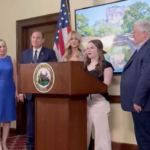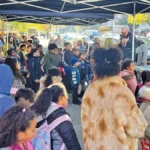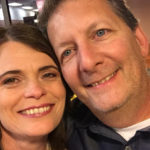
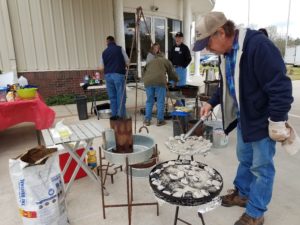
What may be Southern Baptists’ only “Preppers” event took place again last week at Little Cypress Baptist Church in Orange, Texas.
About three hundred “preppers,” people preparing for the possibility of a catastrophic event, gathered for the tenth year at the church in southeast Texas, an area that has suffered multiple devastating natural disasters over the last fifteen years.
“This wasn’t something we decided to do,” said Pastor David Turner. “God started raising up like-minded people, saying, ‘What should we do?’ With this, we get to share the Gospel and preparedness.”
“This” is the Crisis Preparedness Expo. The 2020 event drew preparedness experts who are Christian from several states and twenty areas of expertise: food, water, shelter, gardening, medical triage, outdoor skills, tools, and more.
“We’re trying to teach people how to live like our grandmothers and grandfathers lived,” said Lonnie McCabe Sr., a member for the last dozen years and one of the event’s organizers. “So much has been lost. Even a little bit of preparedness is a good thing.”
Southeast Texas hadn’t seen a devastating hurricane since Category 3 Audrey in 1957 until the Category 2 Rita in September 2005. But since then there have been Humberto in 2007, Ike in 2008, Harvey in 2017 and Tropical Storm Imelda in 2019, plus two bouts of flooding—2016 and 2017—at a five-hundred-year level. A third of the way through this litany of local disasters, the Crisis Expo started.
“It’s natural for people to seek normalcy,” Turner said. “They keep trying to cope, and it gets harder and harder. We’re seeing more depression, alcoholism, marital conflict. Some people crying out to God one week and the next, they’re angry, resentful. That’s grief being expressed. You have a whole region of people in southeast Texas who’ve been in the grief process since 2005.”
The Crisis Preparation Expo provides hope as well as knowledge, the pastor said. As the attendees learn new skills and acquire life-expanding information, they’re able to focus outward, develop goals again, and attain a sense of normalcy even as they continue recovering from the loss of home, possessions, family members, friends, and even employment.
“When we started we were going to do it for our congregation,” McCabe said. But as word about the 2010 event spread, it came to include the entire community, most of them not connected to the church. “It’s been continuously growing, and now we have people coming from all over the country. We’re trying to help everybody and we’re always trying to pray and share the Gospel.”
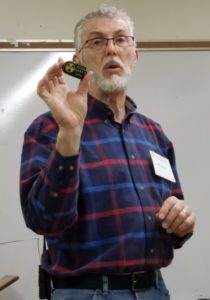
In the Expo Hall, which on Sundays is the church’s multi-purpose worship center, a crowd-drawing oversized bowl of candy on the Mission Committee’s table sits next to a box of free Bibles. Committee members nearby draw attendees into conversation.
A basic “why prepare and how to get started” hour-long class was one of forty options for the two-day event this February 7–8 that focused on sustainable living (gardening, canning, chickens, goats, and the like) as well as “grid-down” events, meaning absence of the nation’s electrical and transportation infrastructure.
“Always involve God in your plan,” McCabe said. “Prepare spiritually, mentally, physically, and materially. When you prepare, you’re not worried. You sleep better at night.”
Food, water, shelter, and safety are immediate concerns whether it’s a natural disaster, terrorist activity, or the complete breakdown of society. The latest government directive is to have two weeks of food available for every person in the family. That’s three meals a day for fourteen days times the number of people. Water: a gallon a day per person.
Pure Fire Tactical was on hand from Florida to demonstrate magnesium fire starter kits; Texas Law Shield, to explain the legal defense it provides for owners of all legal weapons; Orange Amateur Radio Club, to describe low-cost emergency communication using handi-talkies and other ham radio equipment; and Aftershock Preparedness, a company that offers high-protein, no-additive, mylar-sealed packages of more than one hundred dehydrated meal-sized products, some of which are gluten-free.
Classes included homesteading, canning, long-term food storage, bee-keeping, soap-making, outdoor cooking, earth-bag home construction, medical situations, and several more.
This was the first year for the Crisis Preparedness Expo to be a two-day event, and it was the first time for a “celebrity” guest speaker. Mike Lowe, a contestant in the 2017 season of the televised reality show “Alone,” now hosts wilderness adventure camps.
His bottom line advice after forty-five years of testing his outdoor skills: be fit, physically, mentally, and spiritually.
“Eighty percent of the people who could survive, give up as soon as it gets tough,” Lowe said. “Make up your mind beforehand that you’ll make it, rely on Jesus Christ, fight, and stay alive.”
Random bits of advice:
- Buy a few extra items each shopping trip until you have a two-year stockpile.
- When you think you’re all set for whatever may happen, think again. A generator even with extra gas won’t do any good without light bulbs when the ones you have burn out.
- Prepare for short term (two weeks), long-term, and extreme-term disruptions.
“The people who aren’t prepared are the ones who are going to freak out,” McCabe said.
“The opportunities for ministry after a major event are going to be astronomical,” Turner said. “The question is, how many more people can I lead to the Lord if I live another week?”


